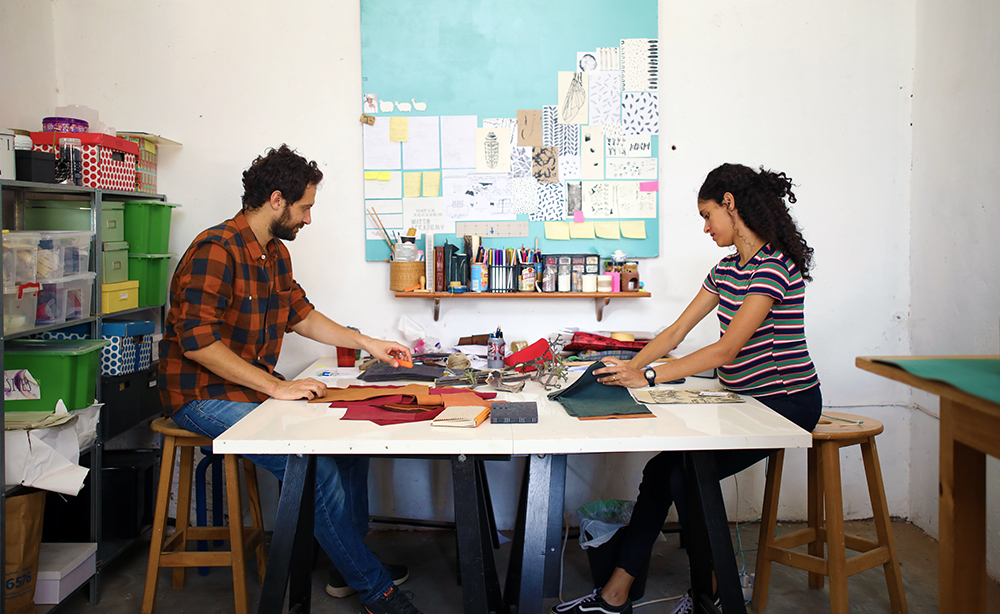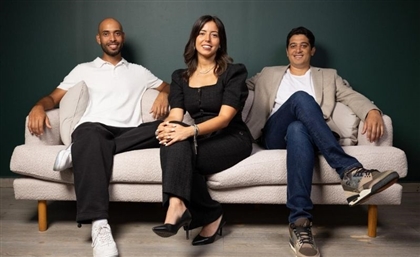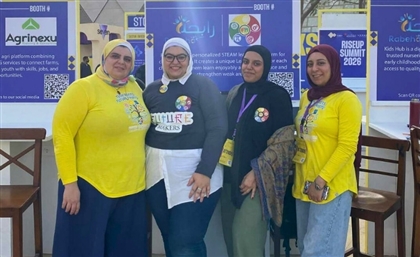Inside Pheel: A Crafty Egyptian Startup Born out of Experimentation
What is it like to be thirsty for experimentation in an industry so comfortable with its monotony? Startup Scene's Leena ElDeeb visits Pheel to find out.

Under the scorching sun of Abou Rawash, a town 25 kilometres away from Cairo's Downtown, rests a double-domed, hut-like studio housing everything from machines, cutters and scissors, to pieces of leather, paper and linen. As she holds the rock fixing the book that she's binding, Nour Sherif shoos a fly away and continues to push through the delirious remnants of summer on a hot Sunday morning.
This picture is a depiction of the entrepreneurial journey of crafters who are still holding onto traditional methods to process and execute innovative ideas. Classically, entrepreneurship and hand-crafters rarely go together for long, but Sherif and her husband Marwan Fayed, co-founders of Pheel, have lived to see and prove otherwise.
“Pheel started as a graduation project seven years ago. We were three graphic design students, each specialising in something different and we were still exploring,” Sherif tells Startup Scene. “We wanted to explore where different materials would take us, so it was more of experimentation that turned it into a brand.”

A startup that is always on the lookout for “emotional connection.”
As they grew and graduated, life took its turn, and the team shrank to just Sherif and Fayed, who later got married, moved to the outskirts of the city and set sail on their business, Pheel - a startup that is always on the lookout for “emotional connection,” as Fayed describes.
Like many startups, the idea of Pheel stemmed from a problem the founders have faced. “The basic product was not there, or was not easily accessible. Plain canvas tote bags for example,” says Sherif. As a mother, having tote bags in abundance was essential. She wants to be able to run an errand with a backpack wrapped around her shoulders, carrying her son in one hand and a tote bag full of snacks in another.
“So, the brand became slowly motivated to produce these very simple essentials and turn them into products, give them character, and put them up for sale.”
Established in 2016, Pheel started with notebooks and stationery. Then the couple-founders thought why not explore more. “We wanted to grow more horizontally instead of digging in one direction and just have one product. But we didn’t foresee that the challenges would be somewhat big,” Fayed says looking at Sherif, prompting a hearty laugh.
“We’ve been collecting contacts since our inception seven years ago," Sherif explains. "Everything is there, it’s just that the suppliers themselves are not aware of what they have. For example, we went to the market to shop for paper, we found that a supplier sold felt paper thinking it was something else and if you went to the market asking for felt you won’t find it, that is for instance."
“On the other end, we have producers. When we were first outsourcing, we found that the mood of experimentation is a rare quality in Egypt,” Fayed says. “It was very difficult to find someone who would be patient enough to go on trial-and-error until a prototype is brought about. It’s not something that is in our culture.”

As she holds the rock fixing the book she's binding, Nour Sherif shoos a fly away and continues to push through the delirious remnants of summer on a hot Sunday morning.
Prototyping is a vital part of the crafty industry that Pheel belongs to. In fact, prototyping is considered the “heart of innovation,” as Roy Rothwell puts it in his book, Successful Industrial Innovation. Outsourced producers refuse to go by the prototyping technique because, from a financial viewpoint, the results don’t immediately meet the time and resources spent. It’s an investment, and crafters – especially outsourced ones – do not have this mentality by nature.
However, in another study by Stanford’s Maria Yang, she finds that committing more time to a project is not necessarily associated with a successful design outcome. Actually, prototypes with fewer parts correlate with better design outcome, as do prototypes that have fewer parts added to them over the course of development. In that case, both executive crafters and visionary designers can meet halfway.
“No one wants to take the risk. Everyone wants to reach a product from the first second,” Fayed reveals about his experience with a renowned producer specialised in making products out of recycled paper when they approached them for one of their newest products: plant pots. Pheel spent five months in a testing phase and material research, trying to solve several problems such as mold and smell. “The dilemma lies always in whether to go to the producer with our theoretical research to execute as it is, or should I have looped them in from the start for a better outcome?” Fayed ponders. “It hurts both our effort that almost always goes in vain due to working separately. Both of us have different capacities that if put and risked together could work in both our benefits.”
“We only outsource production when it comes to items from a new realm that we are trying out,” Sherif says. “We are always going in and out with our production and not only because we’re moving to different scales of production, it’s because we’re involved in a range of items, a range that is still growing.”

“No one wants to take the risk. Everyone wants to reach a product from the first second.”
In November, Pheel released its first clothing line of linen dresses. They wanted to make linen dresses in pure material without polyester without synthetics. So, they bought the material they liked and because they didn’t have enough experience with sewing, they needed to outsource a producer to stitch the pieces together to make their first line a reality.
“As soon as we went with expensive, good quality linen, the producer told us: it won’t work," Sherif reveals. "We said: how come? If this won’t work, what will?”
The lesson Pheel came out with from this experience, along with others, is not to take producers’ words for granted. Both founders realised that, if the first reaction one gets from a producer is “no, it won’t work,” it will work. This reaction doesn’t mean that it won’t happen in reality. It means that this producer doesn’t have this technique or capacity.
“This is a very important tip and it saves so much time, because someone can get tricked into trusting that the person in front of them understands more than they do and if they tell me something I take it for granted and put the entire project at a halt,” says Fayed. “And there are so many people ready to stop projects in this manner, just to make things easier for them.”






















